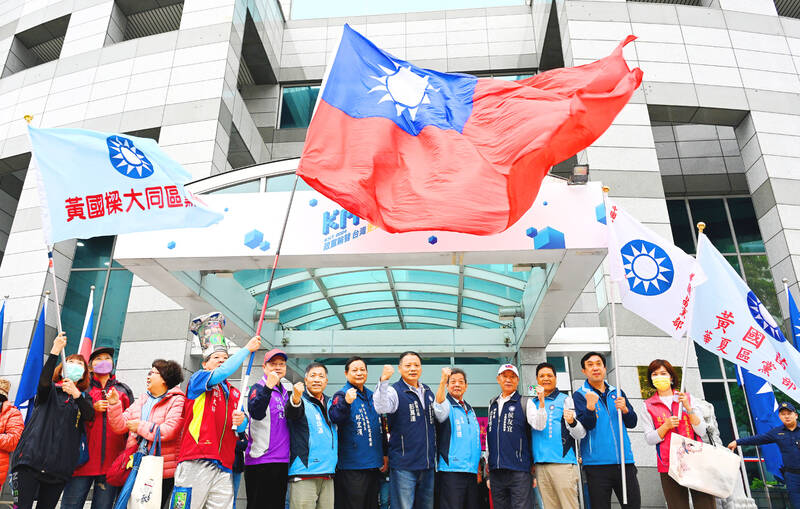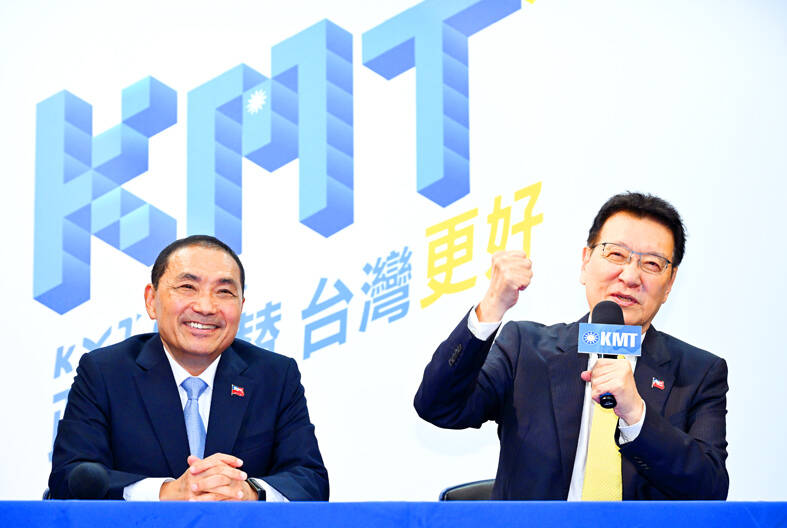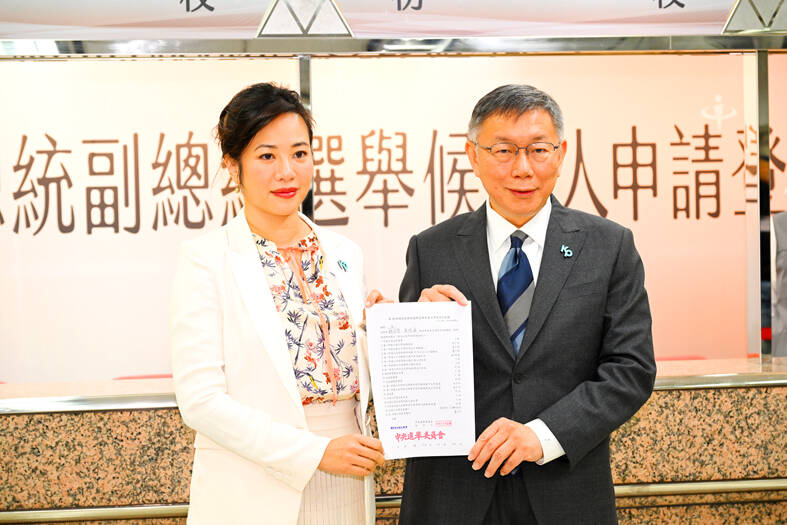The Chinese Nationalist Party (KMT) and Taiwan People’s Party (TPP) registered their own candidates yesterday after a breakdown in coalition talks, while independent candidate Terry Gou (郭台銘) dropped out, setting up a three-way race for the presidential election in January.
TPP Chairman Ko Wen-je (柯文哲) was the first to officially register his candidacy with the Central Election Commission in Taipei yesterday, shortly after naming TPP Legislator Cynthia Wu (吳欣盈) as his running mate.
Wu, the daughter of former Shin Kong Financial Holding Co (新光金控) chairman Eugene Wu (吳東進), is a TPP legislator-at-large who was appointed in November last year and had served previously as vice president of Shin Kong Life Insurance Co (新光人壽).

Photo: Liao Chen-huei, Taipei Times
About an hour after Ko, New Taipei City Mayor Hou You-yi (侯友宜), the KMT candidate, registered at the commission after naming Broadcasting Corp of China (中廣) chairman Jaw Shaw-kong (趙少康) as the party’s vice presidential pick.
Jaw, 73, had parted ways with the KMT in 1993 to form the New Party, in what was a split from the KMT by members of a faction known as the New KMT Alliance.
However, Jaw’s KMT membership was restored in February 2021, as he was seen by some influential members as a prime candidate for the party’s chairmanship and next year’s presidential ticket.

Photo: Liao Chen-huei, Taipei Times
The registrations officially ended the KMT’s bid over the past months to team up with the TPP on a joint opposition ticket in an effort to defeat the Democratic Progressive Party (DPP).
Gou, founder of Hon Hai Precision Industry Co (鴻海精密), known internationally as Foxconn, announced his withdrawal from the election hours before the registration deadline in a brief statement.
Gou did not provide a specific reason, saying that such a decision was “for the future of the Republic of China.”

Photo: Tien Yu-hua, Taipei Times
With the registration deadline past, the election on Jan. 13 is to be a three-way race between the candidates of the KMT and the TPP, and the DPP candidates Vice President William Lai (賴清德) and former representative to the US Hsiao Bi-khim (蕭美琴).
At a news conference yesterday, Hou lauded Jaw as “the most formidable, capable and combat-ready candidate.”
Hou also said that up until the last minute, Jaw had been hoping that the KMT would reach an agreement with Ko on a joint ticket.
Hou said that he had personally called Ko to make a final pitch for a KMT-TPP alliance, but “the call was not answered.”
KMT Chairman Eric Chu (朱立倫) said that although it was humiliating, he and Hou had tried to push for a joint ticket with the TPP.
Chu called for solidarity within the KMT, and urged the members to work toward the common goal of getting Hou elected.
Separately, Ko yesterday said that as the “leader of Taiwan’s opposition parties,” he felt duty bound to enter the election against a ruling party that is “increasingly out of touch with the people and progressive values.”
Taiwan has been plagued by stagnant wages, high housing prices and high rent, with healthcare and labor insurance systems under financial strain, Ko said.
Shortages of labor, land, talent, electricity and water have caused many to become disillusioned and stop pursuing their dreams, he said.
Maintaining the “status quo” in the Strait and pursuing peace is the “common denominator” shared by Taiwan, China and the US, Ko said.
Regarding his running mate, Ko said that Wu had graduated from prestigious colleges in the US and the UK, and had served as the executive director at the Shin Kong Life Foundation.
Wu’s nomination was decided by the TPP’s election committee in a vote, Ko said.

The Taiwanese passport ranked 33rd in a global listing of passports by convenience this month, rising three places from last month’s ranking, but matching its position in January last year. The Henley Passport Index, an international ranking of passports by the number of designations its holder can travel to without a visa, showed that the Taiwan passport enables holders to travel to 139 countries and territories without a visa. Singapore’s passport was ranked the most powerful with visa-free access to 192 destinations out of 227, according to the index published on Tuesday by UK-based migration investment consultancy firm Henley and Partners. Japan’s and

NATIONAL SECURITY THREAT: An official said that Guan Guan’s comments had gone beyond the threshold of free speech, as she advocated for the destruction of the ROC China-born media influencer Guan Guan’s (關關) residency permit has been revoked for repeatedly posting pro-China content that threatens national security, the National Immigration Agency said yesterday. Guan Guan has said many controversial things in her videos posted to Douyin (抖音), including “the red flag will soon be painted all over Taiwan” and “Taiwan is an inseparable part of China,” while expressing hope for expedited “reunification.” The agency received multiple reports alleging that Guan Guan had advocated for armed reunification last year. After investigating, the agency last month issued a notice requiring her to appear and account for her actions. Guan Guan appeared as required,

Japan and the Philippines yesterday signed a defense pact that would allow the tax-free provision of ammunition, fuel, food and other necessities when their forces stage joint training to boost deterrence against China’s growing aggression in the region and to bolster their preparation for natural disasters. Japan has faced increasing political, trade and security tensions with China, which was angered by Japanese Prime Minister Sanae Takaichi’s remark that a Chinese attack on Taiwan would be a survival-threatening situation for Japan, triggering a military response. Japan and the Philippines have also had separate territorial conflicts with Beijing in the East and South China

A strong cold air mass is expected to arrive tonight, bringing a change in weather and a drop in temperature, the Central Weather Administration (CWA) said. The coldest time would be early on Thursday morning, with temperatures in some areas dipping as low as 8°C, it said. Daytime highs yesterday were 22°C to 24°C in northern and eastern Taiwan, and about 25°C to 28°C in the central and southern regions, it said. However, nighttime lows would dip to about 15°C to 16°C in central and northern Taiwan as well as the northeast, and 17°C to 19°C elsewhere, it said. Tropical Storm Nokaen, currently